Black Alumni Association Newsletter: February 2022
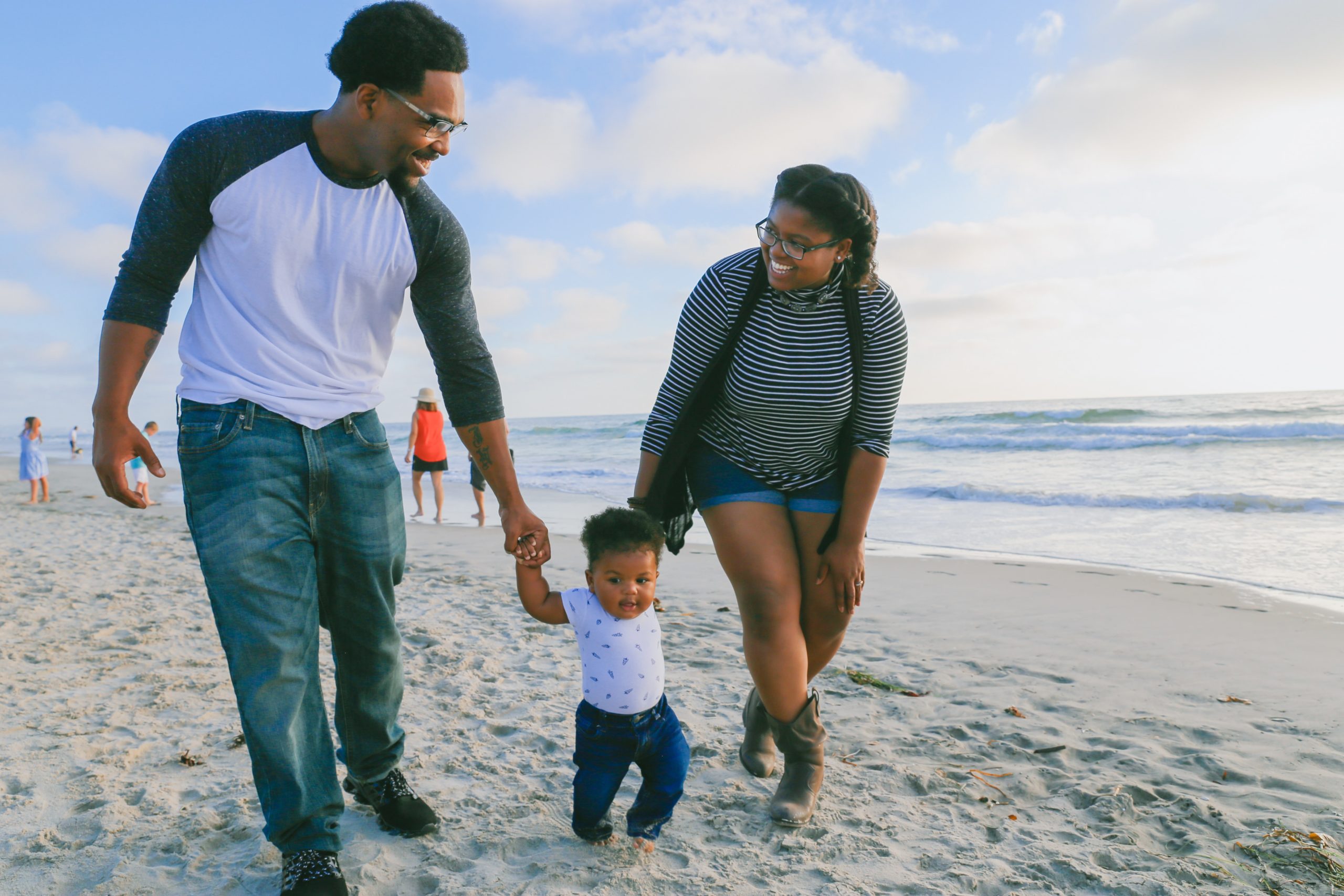
Remember the Pain
BY REV. DR. LEONARD EDLOE
Union Presbyterian Seminary, Th.M ’19
Once again, in February, we celebrate Black History Month. A celebration started by Dr. Carter G. Woodson in 1926 to revel and raise the awareness of black history in this nation. The celebration has focused on our many great achievements, however; I feel, too little attention has been given to the bad along with the ugly. For when we know of the struggles, the pain, and the challenges, the achievements are even more remarkable.
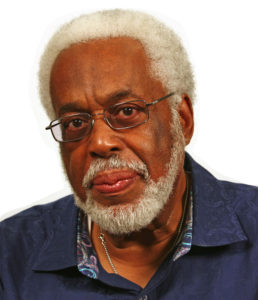
Rev. Dr. Leonard Edloe
I attended segregated Black schools growing up in Richmond, Virginia, the Capital of the Confederacy. I attended Howard University, where the names of the buildings spoke to Black greatness. I attended the then School of Theology at Virginia Union University, where I was exposed by Dr. Miles Jerome Jones to literature that I had never read. It was only, however, when I was in my early 70’s studying at Union Presbyterian Seminary under Dr. Katie Geneva Cannon, that I started to learn about the brutality of slavery and how our educational and religious institutions crafted a narrative. This narrative was enforced by a culture that turned the darkest moments of the history of this nation into a fairy tale, a fairy tale that erased the brutality of slavery and told us Black folk that we should be thankful that our ancestors were enslaved so that they, and now we, would be introduced to their Jesus.
The true history is now being told. In so many instances when we as a people have made progress historically, there has been pushback. What we are seeing today is no different. Laws are being passed banning “Critical Race Theory” in public schools when Critical Race Theory (CRT) is not being taught in our public schools. Rather, it is only taught in higher education (colleges and universities).
Most people have no idea what CRT is today. It is code speech for anything that deviates from the narrative that conceals the brute treatment our enslaved ancestors endured as a people because of race. Public schools must continue to teach the fairy tale since there is academic freedom in higher education. However, now academic freedom is also being challenged and tenure is being denied or eliminated entirely in some states. The narrative will be the only thing allowed to be taught in institutions of higher education.
I must ask the question, who is going to teach our children our story, for many of us have only been taught the narrative? The greater question is, who is going to teach us? For many of us don’t know our story.
The Bible and Science agree that all of us are descendants of the woman from North Africa named Eve. That said, we are made in the image of God. Yet that was taken away from us when English Common Law held that any person who had been baptized was enfranchised or free. The Virginia House of Burgesses nullified that right when it came to Africans who had been enslaved in the colony.
To make enslavers unaccountable for the rape of African women, the legal doctrine of partus sequitur vetrem became law. This ruling made enslaved children born in the colonies take the status of their mothers. Therefore, children of enslaved mothers were born into slavery as chattel (property), even if their father was the enslaver. Not only was the body of African women available on demand for the enslaver, his lust resulted in more free labor and personal property for his business operation. What happened in the Virginia House of Burgesses was just the beginning. I’ll lift up just a few additional examples.
Few know of the slave coffles (doubled lines of thirty men) that marched past the United States Capitol building to the ports in Charleston and Savannah. Massachusetts was the first state to codify slavery. When slavery became less profitable in the North, the enslaved were sold to the plantations in the South. Each man hauled twenty pounds of iron in chains that draped from neck to neck and wrist to wrist binding them together. The march was 700 miles and at least a million enslaved men marched that road for 80 years. That’s just one of the stories that too many of us don’t know, but need to know.
Few know the fact that many religious denominations punished pastors that preached against slavery and that several religious denominations split on a regional basis fifteen years before the nation did. The theologies these denominations taught that negated our personhood in many instances has never been untaught. Sadly, many leaders of these denominations today are proud of their history while at the same time never mentioning slavery.
The story is seldom told of the Plantation Revolt of 1811 in Louisiana. The revolt was suppressed, however, to make sure the enslaved would never try to free themselves again. The heads of many of those who rebelled were placed on poles along the levee.
The actions of ISIS in Iraq doing the same thing a few years ago were rightly condemned. However, most of the population of this nation never realized that as a nation we had done the same thing.
There are stories of slaves that were viciously beaten; not for failing to pick their quota of cotton, but for exceeding their quota. Slaves were constantly reminded that even excellence was not a way to obtain freedom. In fact, excellence could be considered a liability to the enslaved and a threat to the institution of slavery.
There is a monument in New York City honoring James Marion Sims. He is said to be the father of gynecology. He, however, earned that title by performing surgeries on enslaved women without the use of anesthesia. He was not the only one. We were the subjects of medical experiments both in life and in death. In my hometown of the Confederacy (Richmond, Virginia), Virginia Commonwealth University is trying to properly deal with the bones of our ancestors that were found in a well when a new medical building was being constructed. However, because time and money were more important, many bones were never recovered. The well was merely filled to continue construction.
We know of the dark days during and following Reconstruction. These were days when the KKK enforced white cultural values using intimation, violence, and lynching. Many times, lynching was carried out on Sunday morning after worship. There was the overthrow of a duly elected government in Wilmington, North Carolina in 1891. Virginia had its Constitution of 1902 that for all practical purposes shut black people out of the governmental process.
Attention has been given to the Tulsa Race Riot of 1921. However, that followed the Red Summer of 1919 when race riots erupted all over this nation. Many times, these riots resulted because of black men who had served their nation during World War I and had experienced freedom in Europe that they had never experienced before in this country that they were fighting to defend. Just standing tall as they walked the streets of their hometowns was seen as a threat to segregation and the American way of life. That same pushback showed up again after the end of World War II.
I am a child of the Civil Rights movement. I saw Dr. Martin Luther King, Jr. when he came to Richmond for the National Convention of the Southern Christian Leadership Conference. I would listen to his sermon every Sunday on Martin Luther King Speaks. I even had the honor of singing in the choir for Dr. King when he spoke for Charter Day at Howard University. Dr. King, like all martyrs, has been sanitized in death. We have many of his speeches and writings. However, the ones with power, the ones who speak to the challenges of his day are seldom read or discussed.
We have made great strides as a people. However, we must know our entire story. We must embrace the biblical command of Deuteronomy, to forget not so that we will appreciate even more what we have accomplished. By knowing our story, we will have the strength to endure no matter how strong the pushbacks might be from those who think we have come too far!
When Lord?
BY REV. DR. ANGELA DUNCAN
UNION-PSCE M.Div 2003
Habbakuk 1:1- 4 (NRSV)
1 The oracle that the prophet Habakkuk saw.
The Prophet’s Complaint
2 O Lord, how long shall I cry for help, and you will not listen?
Or cry to you “Violence!” and you will not save?
3 Why do you make me see wrong-doing and look at trouble?
Destruction and violence are before me; strife and contention arise.
4 So the law becomes slack and justice never prevails.
The wicked surround the righteous—therefore judgment comes forth perverted.
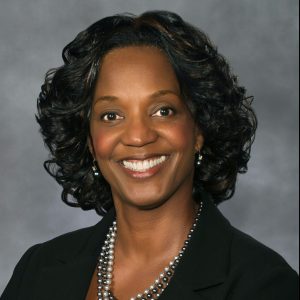
Rev. Dr. Angela Duncan
Just a few days ago, I read an article in Time magazine “A New Report Finds That 45 States Are ‘Failing’ to Teach Students About the Period That Shaped Race Relations After the Civil War” (January 2022). The 2020 murders of Ahmaud Arbery, Breonna Taylor, and George Floyd in the midst of the COVID 19 outbreak sparked new conversations about race relations in America. The conversations on race were not really new, just unresolved old ones. Some issues around race and racism could have been resolved long ago but the sickle of white supremacy and injustice keeps pulling us backward after great gains are made in the African American community. The magazine article finds we are not teaching this generation about the reconstruction period (1865 – 1877), and by failing to do so we miss an opportunity to understand the racism that exists in the United States today. The article goes so far to say that we need to not only teach the negative aspects of the reconstruction period but we should also teach its positive aspects. Such instruction will show how African American communities flourished by creating their own churches, schools, beneficial societies, banks, insurance companies, churches, and schools and will bring understanding and solutions to some of today’s problems. It is important to note that the highest number of African Americans were elected to legislative bodies during this period.
It was during reconstruction that the 13th, 14th, and 15th amendments to the Constitution were written and approved to abolish slavery (unless a person committed a crime); grant citizenship to newly freed enslaved persons, and gave Black men the right to vote. The federal government sent troops to the south to guarantee African American men (women could not vote until the 19th amendment) the right to vote and to oversee the rewriting of the southern states’ constitutions to recognize those most recent amendments. The presidential election in 1876 took 4 months to decide between the Republican Rutherford B. Hayes and Democrat Samuel J. Tilden. Tilden received more popular votes but the Electoral College votes in 3 southern states were disputed. Does this sound familiar? A special electoral commission was established to determine the election and Rutherford B. Hayes became the 19th president of the United States. With his election, he agreed to withdraw the federal troops and allow the southern states “home rule” meaning the federal government would not interfere with how states governed themselves. The end of reconstruction was the beginning of Jim Crow; the period in American history where the south created laws to disenfranchise African Americans and reinstitute a new kind of slavery.
This history shows us that the tactics used during the 2020 election and the insurrection on January 6, 2021, were from an old playbook that began soon after the election of former President, Barack Obama in 2008 and again in 2012. According to those who traditionally hold the power…that was never supposed to happen and the gains made during the Obama administration (health care for one) were consistently threatened.
In 2020, we saw a delay in the acceptance of the popular and Electoral College vote, an undermining of the confidence in the voting process, and an attempt to coerce election officials to “find votes” or push for the use of alternative electors to change the electoral vote count. When all of these tactics failed, there was an attempt to overthrow the government by charging into the capital to disrupt the certification process and deny the will of the people. States began passing laws that make it harder to vote and now there is a movement to stop teaching any history that shines the spotlight on “America’s Original Sin” (Wallis, 2015), the sin of slavery, and racism. Books that teach this history are being banned and teachers are told they can’t teach history that makes anyone feel guilt or shame. I keep hearing “all that happened in the past and why can’t we all just forget it and move on.” I share this graphic when I hear that.
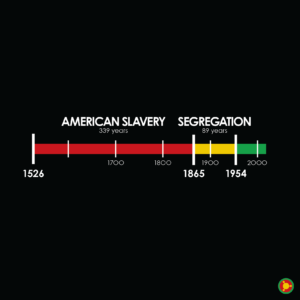
The period from slavery through segregation is longer than the period from 1954 to the present time. The Voting Rights Act was signed into law in 1965 and has been extended several times. In 2013, the Supreme Court ruled that certain parts of the law were unconstitutional and states did not have to get preclearance to change voting laws. The challenge to voting laws would have to come from those who are already disenfranchised and overburdened by systemic barriers on a daily basis.
O Lord, how long shall I cry for help? Why does it feel as if we are almost back where we began?
I often get weary and want to quit but it is my faith that has been built over time that keeps me going. I continue in the fight for the sake of all of our children, grandchildren and all of our descendants.
I wholeheartedly believe that our African American churches must continue to stay relevant for our society today. The Civil Rights movement was born in the church and Black History was taught there too. I believe the church will have to realign itself to fill in the gaps for our children of today (they are not our ancestors and have had privileges our ancestors did not have). I also believe we will need to continue to provide a strong foundation but will need to become more pliable, less rigid and willing to lead from the rear. God answered Habakkuk “write the vision and make it plain” and God answers us and strengthens us “for there is a vision for an appointed time.” My strength is renewed when I witness our young persons in action “so that a runner may read it.” The Black Lives Matter movement has shown that the young folks today can, and are willing, to run with it.
The question for us today is how can we support them and not get in the way?
I’m grateful for the “Katie G. Cannon Center for Womanist Leadership”, and the “Center for Social Justice and Reconciliation”, both centers are part of Union Presbyterian Seminary. I’m grateful because both are helping me and others look at our current challenges in new ways. I want our children to know their history, be resilient and challenge injustice. I stand ready to support them. As Dr. Katie G. Cannon would always say to us “I’m going to give you the best that I have so you can do better!” “Ase” and “Amen.”
Lives Worth Not Forgetting
BY REV. VERONICA THOMAS
MSW Virginia Commonwealth University; MDiv ‘07
“The people came up out of the Jordan on the tenth day of the first month, and they camped in Gilgal on the east border of Jericho. Those twelve stones, which they had taken out of the Jordan, Joshua set up in Gilgal, saying to the Israelites, “When your children ask their parents in time to come, ‘What do these stones mean?’ then you shall let your children know, ‘Israel crossed over the Jordan here on dry ground.’ For the Lord your God dried up the waters of the Jordan for you until you crossed over, as the Lord your God did to the Red Sea,[a] which he dried up for us until we crossed over, so that all the peoples of the earth may know that the hand of the Lord is mighty, and so that you may fear the Lord your God forever” (Joshua 4:19-24 NRSV).
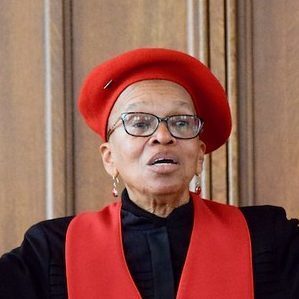
Rev. Veronica Thomas
We see in the scripture above that the memorial of 12 stones was to be a constant reminder of the day the Israelites crossed the Jordan River on dry ground. Their children would see the stones, hear the story and learn about God. Do you have traditions—special dates or special places—to help your children learn about God’s work in your life? Do you take time to tell them what God has done for you—forgiving and saving you, answering your prayers, supplying your needs? Retelling your story will help keep memories of God’s faithfulness alive in your family. Let us tell of “Lives worth not forgetting.”
During the month of February, we celebrate the lives of Black people worth not forgetting who are a part of American history but were robbed of contributions made by them in the life of America. It’s a puzzle why we are considered by some people to be inferior to the whites. All of us came from the same source. God made only one man and we are descendants of Adam. We were all made in the image of God. There are only two classes of people mentioned in the Bible, the Jews and the Gentiles and saints or sinners.
In spite of the many hardships and roadblocks we were able to rise above the hindrances we faced:
- Schools were held in church buildings
- In many black communities, the pastor was the teacher and church members shared in the expenses.
- Black children had two or three months per year for school and the balance of the time was to work in the fields, compared to eight or nine months of school for White children.
- One teacher taught 7 grades in one room.
- Black teachers taught school for $25-36.00 per month. But still, we rise.
Joshua was revered because the miracle was taken as evidence of his closeness to God. We need leaders we can revere, not because they perform miracles, but because they have been marked by an intimate personal relationship with God and his people. Two exemplars are Dr. Katie Geneva Cannon and Dr. Brian K. Blount. Let us not forget them.
Let us not forget Katie Geneva Cannon (1950-2018).
This African American woman is credited with a long list of firsts and an equally long list of academic and scholarly achievements. In 1974 Dr. Cannon was the first African American woman to be ordained in the ministry of the United States Presbyterian Church of the USA. In 1983 she became the first African American to earn a Doctor of Philosophy degree from Union Theological Seminary in New York City. Her degree was awarded in Christian ethics, when she was denied the opportunity to pursue a Doctor of Philosophy degree in Old Testament, because of her color and gender.
Dr. Cannon’s most notable contribution was the development of a theological perspective she called Womanist Theology or Womanism. She and some fellow theologians are the principal architects of Womanist theology. Womanist theology is a “theological construct that seeks to reflect on liberation issues not only as they touch upon matters of race and ethnicity but also as they touch on the unique and continuing status and oppression of black women within the life of the wider American society, the black community in general, and within the life of the black religious community in particular” (An Encylopedia of African American, Christian Heritage, Marvin Mc Mickle, Ed., 2002). When she was elevated from earth to Heaven she was the Annie Scales Rogers Professor of ethics at Union Presbyterian Seminary in Richmond, VA.
Dr. K is my term of endearment for her. Dr. K was assigned to be my advisor, at the time of my arrival in the Fall 2003. Dr. K and Dr. Samuel Roberts were the only African American professors on campus. They were both professors of Christian Ethics. Non-Black students were not hanging off the chandelier to have Black advisors. Therefore, Dr. K gave me credit for her becoming a certified advisor. She was a woman of God who knew without a doubt that she was appointed to teach. Being in the presence of Dr. K, I believe we all can say as the two disciples on the Emmaus Road replied of their encounter with Jesus (and I paraphrase): Were not our hearts burning within us while she talked and opened the scriptures to us? Dr. Katie Geneva Cannon’s Legacy lives on through the Katie G. Cannon Center for Womanist Leadership on the Union Presbyterian Seminary, Richmond campus, one of three significant centers conceived by and established under the leadership of President Brian Blount.
Let us not forget Brian K. Blount
The Reverend Dr. Brian K. Blount is the first African American to become president of Union Presbyterian Seminary in Richmond. At the end of the first year of his presidency, the former Director of Communications, Glenn Birch, interviewed President Blount regarding his first year as President and about shaping a vision for Union-PSCE. One of the questions that he asked Prez (my term of endearment) was: “If you had to name a particular moment of clarity and of confirmation of your call, during this first year, what would it be?”
Prez replied, “I felt a sense of confirmation when I preached in chapel for the first time when I did the convocation sermon. I could tell the energy, both in Charlotte and here in Richmond, because I did the same sermon. When you look out and you see a congregation and you can see that they are looking for something from you, that’s a great responsibility, but it’s also a great confirmation that people trust enough to believe that they can expect something from you. That was a sense of confirmation for me that yes, this is where I need to be; that God is calling me to be here. I would also rank the days in late December when I was here almost by myself working on a document I’ve called “A Catalyst for Conversation for Strategic Planning.” I was compiling material, gathered from listening and talking to faculty, staff, students, board members, and alumni/ae. I was compiling that to help the community hear what I had heard. I felt strongly that I had been invited and placed in this community because people trusted that God had indeed called me here. In those moments, I felt powerfully connected to the larger community.”
Now, in his fifteenth year, Dr.Blount’s contributions to the growth and development of the Richmond and Charlotte campuses of the Seminary include the expansion of the curricula, the increased diversity of faculty, the visibility of the seminary, and the breadth of its program internationally. The enumeration of these contributions is too much for citation in this article.
Thanks, Prez, for answering God’s call: “Who will go?” by responding, “Send me.” Guess what Union: We got the family of four for the price of one! We stand with you and we are committed to holding your hands up that the battle for Christian and theological education may be won.
Let us not forget Dr. Katie G. Cannon and Dr. Brian K. Blount. Amen! So be it!
African Americans and Giving – What About You?
BY REV. DR. HELEN BESSENT BYRD
M.Ed., Temple University ’65; M.Div., Union-PSCE ’07; Ph.D., UConn ’72
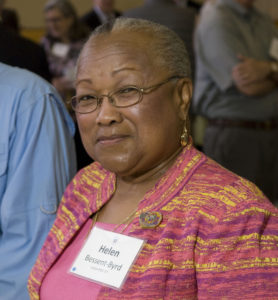
Rev. Dr. Helen Bessent Byrd
Twenty-first-century living tends to fill our lives with many challenges. The more conveniences that are available to us the more of them we seem to desire. All too often the scramble for the balance of parenting, work, and leisure often suppresses opportunities for experiencing the joys of everyday life. This has been especially so since the COVID-19 pandemic has beset our nation and the global society. The source of renewal and strength remains in the Word of God. The psalmist reminds us, “Happy are the people whose God is the Lord.”
It is easier to experience joy when we shift our focus from selfishness to selflessness. We can live lives of persistent and collective joy when our happiness is not based on some short-lived success or on taking advantage of someone else. All of the blessings that we receive are entrusted upon each of us by the grace of God who expects us to share them with others. Jesus said: ”Give, and it will be given to you. A good measure, pressed down, shaken together, running over, will be put into your lap; for the measure you give will be the measure you get back” (Luke 6:38).
African Americans are generally believers in this Christian guidance. It was quite a surprise to learn from an article written by Michelle Singletary in 2020 that, “Black Americans give a larger share of their wealth to charities than any other racial group in America.” This fact is dissonant with the stereotypical notions that Black Americans are the “welfare queens,” that Black people are takers, not givers, that Blacks are not philanthropists. The fact that is often left out of the discussion of giving is that, in spite of lower incomes and thus greater poverty, as Shena Alexander explains, “When you look at charitable giving as a share of the median wealth, Black Americans give considerably more.”
Singletary commented in her aforementioned article that Black philanthropy also tends to include person-to-person giving and giving in their churches to their local communities. She said, “Think about how much harder it is for many Black Americans to be so generous, given the systemic racism that has impeded their ability to build wealth in their families. Furthermore, Singletary quotes Ciciley Moore, a program officer for Kellog Foundation who said, “Black people give not out of guilt but from a desire to lift others up….It is this kind of giving and this kind of ancestral love and generosity and strength that has carried Black folks through moments of joy and injustice. “Most aren’t ridiculously rich, giving out of an abundance of assets they won’t miss; they are effecting change in their own communities. They are literally saving lives.”
What about you and your degree of selflessness? What is your practice of giving? What is your portion of giving to religious bodies and to charitable organizations in general?
Being generous of spirit is a wonderful way to live. It is the Christian way of living. Indeed, every generous act of giving, with every perfect gift, is from above (James 1:7a). We should do as John Wesley taught: “ Do all the good you can, by all the means you can, in all the ways you can, in all the places you can, at all the times you can, to all the people you can, as long as ever you can.” Then may this benediction of Paul to the Romans rest on you, “May the God of hope fill you with all [collective] joy and peace in believing, so that you may abound in hope by the power of the Holy Spirit” (Rom. 15:13). All who believe in and follow the Triune God, including helping those in need, will promote solidarity among us all and will experience the collective joy in serving the Lord!
Remember to give to UPSeminary also. Although it may have been years ago when you were facing tuition and fees, room and board, internship, and supervised ministry expenses, those required experiences and expenditures are likely much more costly now. Please go to the website and give. Note on the online form or on your check BAA to tag this relationship and reminder.

